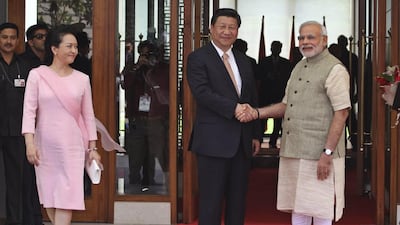AHMEDABAD, India // Chinese president Xi Jinping landed in the Indian prime minister’s home state of Gujarat on Wednesday for a three-day visit expected to focus on India’s need to improve worn out infrastructure and reduce its trade deficit.
Mr Xi was greeted by state officials in Gujarat’s main financial city of Ahmedabad.
Prime Minister Narendra Modi is expected to court Chinese business and seek investment to upgrade creaky infrastructure, banking on China’s track record at building highways, railways, and industrial zones.
India is also eager to address the imbalance in their annual trade, which now totals around $65 billion (Dh239bn) but is skewed toward imports of Chinese electrical equipment and parts.
Mr Modi and his government staged a lavish welcome for Mr Xi, with billboards across Ahmedabad showing a smiling Mr Modi and Mr Xi.
A banquet dinner was held on Wednesday night, as Mr Modi also celebrated his 64th birthday.
Mr Xi was equally effusive in expressing excitement for the visit.
"China-India relations have become one of the most dynamic and promising bilateral relations in the 21st century," he wrote in The Hindu newspaper.
The choice of Gujarat as Mr Xi’s first stop in India, rather than the capital New Delhi, marked a departure from protocol that some saw as a sign of warming ties between China and India. Relations had been tested by a decades-old border dispute and fears of China’s growing military and economic might.
Mr Xi will meet officials in New Delhi on Thursday.
India has also long aimed at becoming the next massive cheap labour economy, Mr Modi pledging to streamline business and build up industry to make that happen.
But not everyone in Gujarat was excited about the Chinese leader’s visit.
Small business owners have grown increasingly nervous about the calls for warmer relations and increased trade, fearing they will be sidelined by Chinese competitors.
“We need to tread with care since China is a global manufacturing hub itself, which sees us as a market for their goods,” said Bhagyesh Soneji, chairwoman of the Gujarat branch of the associated chambers of commerce and industry of India.
She hoped the two leaders would take “one small step at a time to ensure that there is no threat to the nascent local industry”.
Small business leaders said some industries were already struggling to compete with Chinese companies who were benefiting from subsidies and soft loans.
But for India’s vast numbers of poor, there are some clear benefits from Chinese imports.
Low-end Chinese mobile phones have flooded the Indian market and beaten domestic brands on affordability.
“For the poor among the consumers, if it lasts a year and serves their basic needs, it is more than enough,” said telephone shop owner Kaushik Kamdar. “Patriotic concerns don’t weigh heavily on the minds of people living by the day.”
* Associated Press

